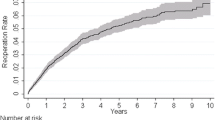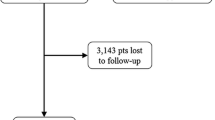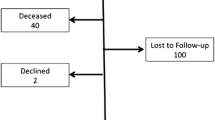Abstract
Background
A small but significant percentage of patients are considered failures after laparoscopic Nissen fundoplication (LNF). We sought to identify preoperative predictors of failure in a cohort of patients who underwent LNF more than 10 years ago.
Methods
Of 312 consecutive patients undergoing primary LNF between 1992 and 1995, recent follow-up was obtained from 166 patients at a mean of 11.0 ± 1.2 years. Eight additional patients who underwent reoperation were lost to follow-up but are included. Failure is broadly defined as any reoperation, lack of satisfaction, or any severe symptoms at follow-up. Potential predictors evaluated included sex, age, body-mass index (BMI), response to acid reducing medications (ARM), psychiatric history, typical versus atypical symptoms, manometry, esophageal pH, and others. Logistic regression was used to assess significance of predictors in univariate analysis.
Results
Of 174 known outcomes, 131 were classified as successful (75.3%), while 43 were failures (24.7%): 26 reoperations, 13 unsatisfied, and 13 with severe symptoms. Response and lack of response to ARM were associated with 77.1% and 56.0% success rates respectively (P = 0.035). Eighty five percent of patients with typical symptoms had a successful outcome, compared to only 41% with atypical symptoms (P < 0.001). Preoperative morbid obesity (BMI > 35 kg/m2) was associated with failure (P = 0.036), while obesity (BMI 30–34.9 kg/m2) was not. A history of psychiatric illness trended toward significance (P = 0.06).
Conclusions
In a cohort with 11 years follow-up after LNF, factors predictive of a successful outcome include preoperative response to ARM, typical symptoms, and BMI < 35 kg/m2. Patients with atypical symptoms, no response to ARM, or morbid obesity should be informed of their higher risk of failure. Some patients in these groups do have successful outcomes, and further research may clarify which of these patients can benefit from LNF.
Similar content being viewed by others
References
Anvari M, Allen C, Marshall J, Armstrong D, Goeree R, Ungar W, Goldsmith C (2006) A randomized controlled trial of laparoscopic Nissen fundoplication versus proton pump inhibitors for treatment of patients with chronic gastroesophageal reflux disease: one-year follow-up. Surg Innov 13(4):238–249
Lundell L, Miettinen P, Myrvold HE, Hatlebakk JG, Wallin L, Malm A, Sutherland I, Walan A (2007) Seven-year follow-up of a randomized clinical trial comparing proton-pump inhibition with surgical therapy for reflux oesophagitis. Br J Surg 94:198–203
Lundell L, Miettinen P, Myrvold HE, Pedersen SA, Liedman B, Hatlebakk JG, Julkonen R, Levander K, Carlsson J, Lamm M, Wiklund I (2001) Continued (5-year) follow-up of a randomized clinical study comparing antireflux surgery and omeprazole in gastroesophageal reflux disease. J Am Coll Surg 192(2):172–179
Mahon D, Rhodes M, Decadt B, Hindmarsh A, Lowndes R, Beckingham I, Koo B, Newcombe RG (2005) Randomized clinical trial of laparoscopic Nissen fundoplication compared with proton-pump inhibitors for treatment of chronic gastro-oesophageal reflux. Br J Surg 92:695–699
Mehta S, Bennett J, Mahon D, Rhodes M (2006) Prospective trial of laparoscopic Nissen fundoplication versus proton pump inhibitor therapy for gastroesophageal reflux disease: seven-year follow-up. J Gastrointest Surg 10(9):1312–1317
Morgenthal CB, Shane MD, Stival A, Gletsu N, Milam G, Swafford V, Hunter JG, Smith CD (in press) The durability of laparoscopic Nissen fundoplication: eleven year outcomes. J Gastrointest Surg
Bammer T, Hinder RA, Klaus A, Klingler PJ (2001) Five- to eight-year outcome of the first laparoscopic Nissen fundoplications. J Gastrointest Surg 5:42–48
Dallemagne B, Weerts J, Markiewicz S, Dewandre JM, Wahlen C, Monami B, Jehaes C (2006) Clinical results of laparoscopic fundoplication at ten years after surgery. Surg Endosc 20:159–165
Hunter JG, Trus TL, Branum G, Waring JP, Wood WC (1996) A physiologic approach to laparoscopic fundoplication for gastroesophageal reflux disease. Ann Surg 223:673–687
Anvari M, Allen C (2003) Five-year comprehensive outcomes evaluation in 181 patients after laparoscopic Nissen fundoplication. J Am Coll Surg 196(1):51–57
Peters JH, DeMeester TR, Crookes P, Oberg S, de Vos Shoop M, Hagen J, Bremner CG (1998) The treatment of gastroesophageal reflux disease with laparoscopic Nissen fundoplication: prospective evaluation of 100 patients with “typical” symptoms. Ann Surg 228(1):40–50
Johnson DA (2004) Endpoints for the assessment of response to gastroesophageal reflux disease therapy- what are the appropriate measures of “success”? Rev Gastroenterol Disord 4(3):118–129
O’Boyle CJ, Watson DI, DeBeaux, Jamieson GG (2002) Preoperative prediction of long-term outcome following laparoscopic fundoplication. ANZ J Surg 72:471–475
Power C, Maguire D, McAnena O (2004) Factors contributing to failure of laparoscopic Nissen fundoplication and the predictive value of preoperative assessment. Am J Surg 187:457–463
Campos GMR, Peters JH, DeMeester TR, Öberg S, Crookes PF, Tan S, DeMeester SR, Hagen JA, Bremner CG (1999) Multivariate analysis of factors predicting outcome after laparoscopic Nissen fundoplication. J Gastrointest Surg 3(3):292–300
Pidoto RR, Fama F, Giacobbe G, Florio MAG, Cogliandolo A (2006) Quality of life and predictors of long-term outcome in patients undergoing open Nissen fundoplication for chronic gastroesophageal reflux. Am J Surg 191:470–478
Jackson PG, Gleiber MA, Askari R, Evans SRT (2001) Predictors of outcome in 100 consecutive laparoscopic antireflux procedures. Am J Surg 181:231–235
Khajanchee YS, O’Rourke RW, Lockhart B, Patterson EJ, Hansen PD, Swanstrom LL (2002) Postoperative symptoms and failure after antireflux surgery. Arch Surg 137:1008–1014
Lord RVN, Kaminski A, Öberg S, Bowrey DJ, Hagen JA, DeMeester SR, Sillin LF, Peters JH, Crookes PF, DeMeester TR (2002) Absence of gastroesophageal reflux disease in a majority of patients taking acid suppression medications after Nissen fundoplication. J Gastrointest Surg 6:3–10
Soper NJ, Dunnegan D (1999) Anatomic fundoplication failure after laparoscopic antireflux surgery. Ann Surg 229(5):669–677
Allen CJ, Anvari M (2002) Preoperative symptom evaluation and esophageal acid infusion predict response to laparoscopic Nissen fundoplication in gastroesophageal reflux patients who present with cough. Surg Endosc 16:1037–1041
Sontag SJ, O’Connell S, Khandelwal S, Greenlee H, Schnell T, Nemchausky B, Chejfec G, Miller T, Seidel J, Sonnenberg A (2003) Asthmatics with gastroesophageal reflux: long term results of a randomized trial of medical and surgical antireflux therapies. Am J Gastroenterol 98(5):987–999
Anvari M, Allen C (2003) Surgical outcome in gastro-esophageal reflux disease patients with inadequate response to proton pump inhibitors (2003) Surg Endosc 17:1029–1035
Anvari M, Bamehriz F (2006) Outcome of laparoscopic Nissen fundoplication in patients with body mass index ≥ 35. Surg Endosc 20(2):230–234
Patterson EJ, Davis DG, Khajanchee Y, Swanstrom LL (2003) Comparison of objective outcomes following laparoscopic Nissen fundoplication versus laparoscopic gastric bypass in the morbidly obese with heartburn. Surg Endosc 17(10):1561–1565
Velanovich V, Karmy-Jones R (2001) Psychiatric disorders affect outcomes of antireflux operations for gastroesophageal reflux disease. Surg Endosc 15:171–175
Kamolz T, Granderath FA, Pointer R (2003) Does major depression in patients with gastroesophageal reflux disease affect the outcome of laparoscopic antireflux surgery? Surg Endosc 17:55–60
Khajanchee YS, Hong D, Hansen PD, Swanstrom LL (2004) Outcomes of antireflux surgery in patients with normal preoperative 24-hour pH test results. Am J Surg 187(5):599–603
Author information
Authors and Affiliations
Corresponding author
Rights and permissions
About this article
Cite this article
Morgenthal, C.B., Lin, E., Shane, M.D. et al. Who will fail laparoscopic Nissen fundoplication? Preoperative prediction of long-term outcomes. Surg Endosc 21, 1978–1984 (2007). https://doi.org/10.1007/s00464-007-9490-7
Received:
Revised:
Accepted:
Published:
Issue Date:
DOI: https://doi.org/10.1007/s00464-007-9490-7




